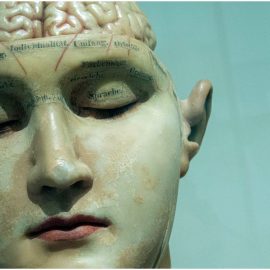

This article gives you a glimpse of what you can learn with Shortform. Shortform has the world’s best guides to 1000+ nonfiction books, plus other resources to help you accelerate your learning.
Want to learn faster and get smarter? Sign up for a free trial here .
Do you want to learn about psychological trauma? How do traumatic experiences change us as people?
Dealing with psychological trauma is a uniquely personal experience, which can make you feel alone and helpless. But the paths towards healing have been trodden by others who’ve experienced similar misfortunes. Reading books about trauma can help you see how others have navigated similar experiences so you can see them in a new light.
In this article, we’ve compiled a roundup of the best books about trauma from our library.
Books About Trauma
Traumatic experiences exert a powerful, lasting influence on your personality, affecting the way you view the world and relate to other people. But your trauma defines you only as much as you allow it to. The following books about trauma can help you reclaim your life from the grip of the past and open yourself to the new gifts life has to offer.
If you suffer from persistent anxiety, depression, or illness, you might be playing out trauma from your family’s past. In this case, the question to ask is not “What’s wrong with me?” but “Where did this come from?”
In It Didn’t Start With You, Mark Wolynn says the source of your suffering may lie hidden in your unconscious, where traumas from your past—and your family’s past—are stopping you from being truly happy and free. Wolynn shares the latest research to reveal how traumas get passed biologically from one generation to the next. He also describes how you can uncover and resolve deeply-rooted trauma by applying his unique therapeutic approach. By doing so, he says, you can reprogram your body, stop suffering, and start living a life you love.
In What Happened to You?, Oprah Winfrey and renowned psychiatrist Bruce D. Perry discuss how childhood trauma can have a severe and lasting impact on the brain—and thus our worldview, health, and behavior—sometimes without us even realizing it. They discuss why the developing brain is so susceptible to trauma, why trauma survivors often experience flashbacks, and why it’s so important to address your trauma to live a healthy and happy life. They also describe how to begin the healing process with compassion for yourself and others.
Trauma can stem from abuse to a severe car accident to wartime combat—and cause a lifetime of flashbacks, nightmares, isolation, insomnia, hypervigilance, and rage. In The Body Keeps the Score, the author explores how diagnosing and treating trauma has evolved as new technologies, research, and fields of science emerged.
We all have a deep-rooted need to be loved, but often a rift opens between our romantic partners and ourselves. Why does this happen, and can anything be done?
In Getting the Love You Want, Harville Hendrix and Helen LaKelly Hunt suggest that we unconsciously seek out romantic partners to help us resolve unfinished business from our childhood. When our partners fail to meet our unconscious expectations, our relationships fall apart. To prevent this, Hendrix and Hunt designed a process to change the way couples interact, allowing them to learn about their unconscious needs and to transform their lives into a conscious, loving union.
Rupi Kaur experienced oppression and abuse throughout her life. From an uncle who raped her as a child to a father who demanded she stay silent, she grew up in an environment that taught her she was worthless. However, as she grew up, her experiences with love and heartbreak taught her how to find the beauty in herself and how to heal in the face of painful experiences.
Milk and Honey is an award-winning collection of poems that dive into the themes of sexual assault, the complexity of relationships, and the healing power of self-love. Through her use of beautiful language, Kaur takes you on her emotional journey to love herself in the face of painful and oppressive experiences.
In The Sun and Her Flowers, poet and visual artist Rupi Kaur explores her inner emotional self, her relationships, her experiences with trauma and insecurity, and its effect on her relationships. Through her style of minimalist drawings and poems, she connects things in her personal life to larger social issues: Kaur’s relationship with her mother connects to the struggles of immigrants, refugees, and women of color living in misogynistic societies. A new healthy romantic partnership connects to the joy and difficulty of healing and learning self-love.
Mental health disorders affect millions of people and often lead to the tragic loss of life through suicide. The pain and suffering that accompany mental illness are difficult for those unafflicted to understand. Kay Redfield Jamison, a clinical psychologist living with manic-depressive disorder, has attempted to bring awareness to those experiences in her memoir. By divulging the violent, frenzied, and dangerous aspects of her disease, Jamison hopes to create more understanding about mental illness and more empathy for those who struggle to exist in the normal world.
Maybe You Should Talk to Someone
Maybe You Should Talk to Someone is a memoir by psychotherapist and author Lori Gottlieb. She discusses a difficult time in her life following a sudden breakup with her long-term boyfriend. The incident upset her so badly that it drove her to seek therapy herself.
This book is the story of Lori’s time in therapy, interwoven with stories about Lori’s own patients. Though each of their situations is different, their shared struggles and how they overcome them reflect common experiences that all people share—in fact, Lori says that the reason therapists can be effective is precisely because they have those same struggles. As Lori and her patients work together toward health and understanding, they reflect on their pasts—how they got to be where they are now—and the futures they’d like to have.
Final Words
Trauma leaves a lasting imprint on your psyche, which can take decades to recover from. Reading books about trauma can help you learn coping strategies and expose you to new perspectives that can pave the way toward healing.

Want to fast-track your learning? With Shortform, you’ll gain insights you won't find anywhere else .
Here's what you’ll get when you sign up for Shortform :
- Complicated ideas explained in simple and concise ways
- Smart analysis that connects what you’re reading to other key concepts
- Writing with zero fluff because we know how important your time is






